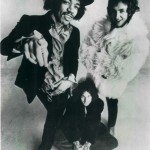SMPC Day 4: Session 1 (Beyond the Concert Hall)
So we come to the final blog for SMPC. The final day also featured the public lecture by Dan Levitin but sadly I was not able to attend this due to the conflict with my flight time. If anyone would like to write about this for the blog then just let me know and I would be happy to put it up for everyone.
 Sunday was as sunny and pleasant as most of the other days we spent in Toronto and Andrea Halpern and I sat outside for our final breakfast in the hotel after checking out. We then wandered towards the conference for the 8.40am start (yes, on a Sunday…) and I spent the first session in an intriguingly titled session ‘Beyond the Concert Hall’.
Sunday was as sunny and pleasant as most of the other days we spent in Toronto and Andrea Halpern and I sat outside for our final breakfast in the hotel after checking out. We then wandered towards the conference for the 8.40am start (yes, on a Sunday…) and I spent the first session in an intriguingly titled session ‘Beyond the Concert Hall’.
The first speaker was John Ashley Burgoyne (University of Amsterdam, The Netherlands) who has been working with Henkjan Honing on a project that he called ‘Hooked’. The project is all about trying to work out what parts of a song make them most memorable , which these authors equate to an idea of “catchiness”.
 John and his team have designed a musical game that will soon be available on i-platforms, such as iPhones and iPads. The game presents popular songs and asks people if they know them. If they say ‘no’, then another song is presented. If they say ‘yes’ then they are presented with a snippet of the song that goes blank after a few seconds and then re-enters again at either the right or wrong place.
John and his team have designed a musical game that will soon be available on i-platforms, such as iPhones and iPads. The game presents popular songs and asks people if they know them. If they say ‘no’, then another song is presented. If they say ‘yes’ then they are presented with a snippet of the song that goes blank after a few seconds and then re-enters again at either the right or wrong place.
Players have to continue singing the song in their head in the blank time and then make a decision as to whether the musical continuation is synced correctly or not.
So far John and his team have piloted with 26 people using 160 songs. They have found some interesting patterns in the data relating to start time of the snippet, with the task apparently being harder when the snippet starts later in the song.
They also found that people are not particularly good at judging what is catchy, if you compare their estimates of catchiness in songs to their performance on the task. Much more interesting data will follow from this project I am sure.
 The second talk was Nat Condit-Schuktz (Univeristy of Ohio State, USA) who has been working with David Huron on the question of intelligibility in song lyrics. Nat is interested in how lyrics and music combine together to contribute to the emotional, social and cultural aspects of a song. But do listeners always pay attention to lyrics? Do they always get them right?
The second talk was Nat Condit-Schuktz (Univeristy of Ohio State, USA) who has been working with David Huron on the question of intelligibility in song lyrics. Nat is interested in how lyrics and music combine together to contribute to the emotional, social and cultural aspects of a song. But do listeners always pay attention to lyrics? Do they always get them right?
Of course we know that they don’t always need to understand lyrics in order to enjoy vocal music, otherwise English speakers like me could not enjoy Italian and German operas. There is also a wonderful tradition of people mishearing the lyrics to songs (see www.amIright.com for fun examples).
 Studies of architectural acoustics ave suggested that up to 26.3% of song lyrics might be misheard in a single performance. Nat was interested in how genres differ in their success at accurately communicating lyrical content.
Studies of architectural acoustics ave suggested that up to 26.3% of song lyrics might be misheard in a single performance. Nat was interested in how genres differ in their success at accurately communicating lyrical content.
In his study Nat compared intelligibility of lyrics on 12 different genres selected from www.allmusic.com.
He selected 20 songs from each that contained a suitable phrase (randomly selected) for testing. There turned out to be quite significant variance in the lyric identification success. Classical (in English before you ask) was the worse with less than 50% correct. Also poor were Rock/Pop and Avante Garde which were just under 70%. The best three genres were Theatre, Country and Jazz, with over 90% correct.
 Turns out that people who claim that they like to attend to lyrics in their normal listening life did worse overall on the task, which is quite a fun contradiction.
Turns out that people who claim that they like to attend to lyrics in their normal listening life did worse overall on the task, which is quite a fun contradiction.
But people who say lyrics are important and who have more singing experience were better overall which is probably not surprising.
This work lays the groundwork for future studies of what makes lyrics more or less intelligible in live and recorded music including pitch, reverb and aspects of mixing.
After this talk I had to skip out for a bathroom break and I got caught in an interesting conversation so I am afraid I missed the talk by Richard Hass (Rowan University, USA) on ‘The Chorus effect’ though I gather that this was an interesting study of data originally gathered by Carol Krumhansl as part of her ‘Plink’ studies of musical memory, and investigated the impact of tonal complexity on people’s memory for songs.
The last talk was by Arielle Bonneville-Roussy (University of Cambridge, UK) who has been working on a study of how perceived and objective musical attributes impact on musical taste.
 Arielle has been using online testing and sought to explore the variance in musical taste that has been left unexplained by many studies of personality, political leanings, and general attributes such as gender, age and education – how much variance in taste is left to explain? Only about 80%! 80% we don’t know why people like the things that they like.
Arielle has been using online testing and sought to explore the variance in musical taste that has been left unexplained by many studies of personality, political leanings, and general attributes such as gender, age and education – how much variance in taste is left to explain? Only about 80%! 80% we don’t know why people like the things that they like.
Her study relies on extracting objective musical attributes from songs and comparing these to people’s perceived characteristics.
In two studies Arielle asked people to report on their perceptions of musical attributes as well as their liking. She used stepwise multiple regression to show that objective attributes of the music accounted for between 29% and 67% of the variance in music taste. In turn perceived attributes accounted for about 1/3 of the variance.
Overall, Arielle found that musical taste is largely determined by the characteristics of the music itself rather than the listener, and any of their particular traits, ideas or preferences. It’s all about the music!
 At the end of this session I sat alone in the lecture room putting up SMPC blog 6 for you, dear reader (this is SMPC blog 11, by the way). To my slight shock but great amusement the room lights went out after about 10 minutes, plunging my into bemused darkness. I stumbled around looking for the light and managed to walk into the door. I am sure that it would be really funny to watch back this scene of physical comedy. In the end I managed to find the light and put up the blog by the time the final session started.
At the end of this session I sat alone in the lecture room putting up SMPC blog 6 for you, dear reader (this is SMPC blog 11, by the way). To my slight shock but great amusement the room lights went out after about 10 minutes, plunging my into bemused darkness. I stumbled around looking for the light and managed to walk into the door. I am sure that it would be really funny to watch back this scene of physical comedy. In the end I managed to find the light and put up the blog by the time the final session started.
Postscript
Sadly, I am not able to report on the very last session of SMPC as my notes for it were lost somewhere between Toronto and London.
SMPC was a hugely busy, dynamic and impressive conference that contained a wealth of data from a number of fields aligned to music psychology. I have only been able to provide a small sample of that data for you in these blogs, the things I was able to see myself, but I hope you found the reports interesting and inspiring.
 I may go a little quite for a time now as I am moving to Switzerland in a few days to take up my new job as Visiting Professor for Performance Science at the Hochschule Luzern. I can’t wait to get started and to tell you, dear reader, all about my adventures and discoveries once I am settled. Wish me luck!
I may go a little quite for a time now as I am moving to Switzerland in a few days to take up my new job as Visiting Professor for Performance Science at the Hochschule Luzern. I can’t wait to get started and to tell you, dear reader, all about my adventures and discoveries once I am settled. Wish me luck!
One Comment
Buck
Thanks for sharing all the wonderful!
Hope the process of moving treats you well. Looking forward to reading of your adventures in Die Schweitz,